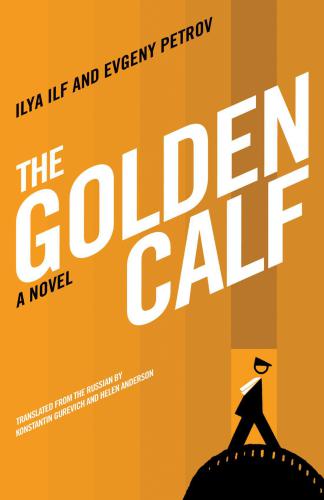
The Golden Calf
- اطلاعات
- نقد و بررسی
- دیدگاه کاربران
نقد و بررسی

Starred review from October 26, 2009
A hilarious blend of absurdist, futurist and surrealist sensibilities, this new (and only complete) translation of Ilf and Petrov's novel following The Twelve Chairs
, first serialized in 1931, is a highly animated tale of a con artist's journey through the cities and hinterlands of Soviet Russia. Part anarchist, part Quixote and part jester, “grand strategist” Ostap Bender, along with his lackeys, rides through the country in a yellow jalopy in search of the elusive “secret millionaire” Alexander Koreiko. Along the way, a superabundance of wild, arresting images and uncanny scenarios materialize, from an elaborate bureaucracy housed in a former hotel where the “white bathtubs were filled with files,” to the introduction of a puzzle maker attempting to make a riddle out of the word “industrialisation”; from the sight of doormen “selling white-striped watermelons by their doorways” to the use of a telegram machine missing a letter. It's an invigorating journey through innumerable paradoxes, dreams and burlesque routines, and though it's intensely chaotic (at times to dizzying effect), this is a finely translated edition of a triumphant literary experiment.

January 15, 2010
"War and Peace, Crime and Punishment", and "Doctor Zhivago" weigh so heavily on Russian literature that many readers don't realize that there are some truly hilarious Russian novels. This classic picaresque, first serialized in 1931, is one of them. Enlisting the help of two other con artists and a simple chauffeur, Ostep Bender devises one ridiculous scheme after another to wrest a million rubles from another con man, who's living a quiet life waiting for socialism to end, toting the wealth he can't spend in a comically enormous suitcase. Although Bender is a crook with hundreds of nonviolent ways to separate people from their money, his mark is equally crooked. Furthermore, because the original wealth was acquired from an absurd system rather than an innocent individual, the reader feels a greater affinity with the antihero. When Bender finally succeeds in stripping his mark of a million rubles, he isn't any happier. In this way, the novel is able to satirize both Soviet collectivism and capitalism. VERDICT This outstanding work recalls Jaroslav Haek's "The Good Soldier vejk" and will appeal to a wide range of readersK.H. Cumiskey, Duke Univ. Lib., Durham, NC
Copyright 2010 Library Journal, LLC Used with permission.




دیدگاه کاربران